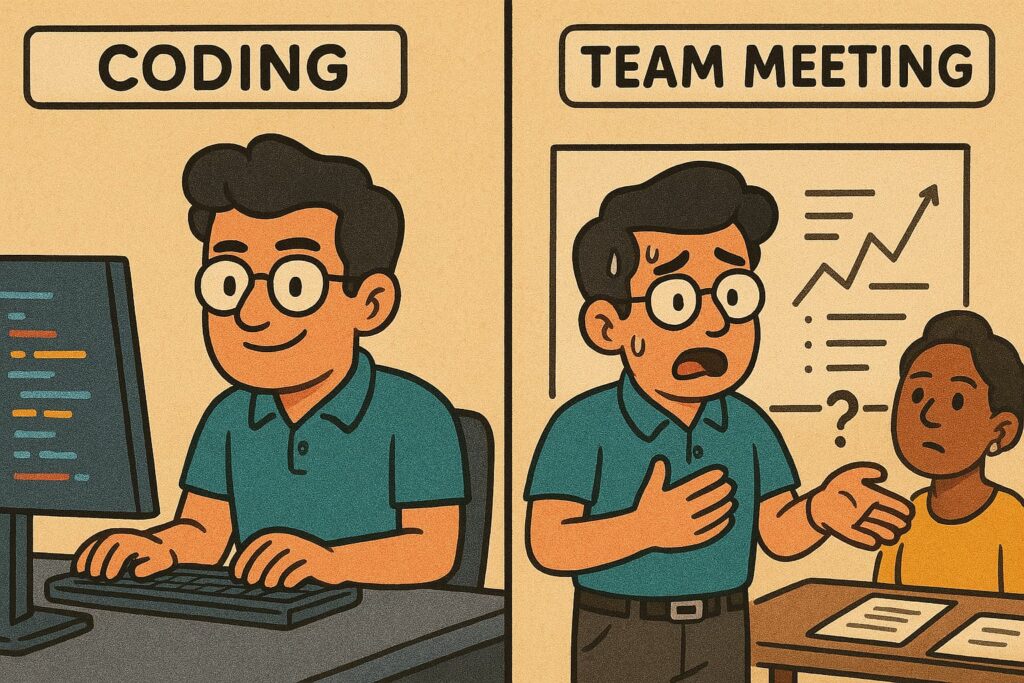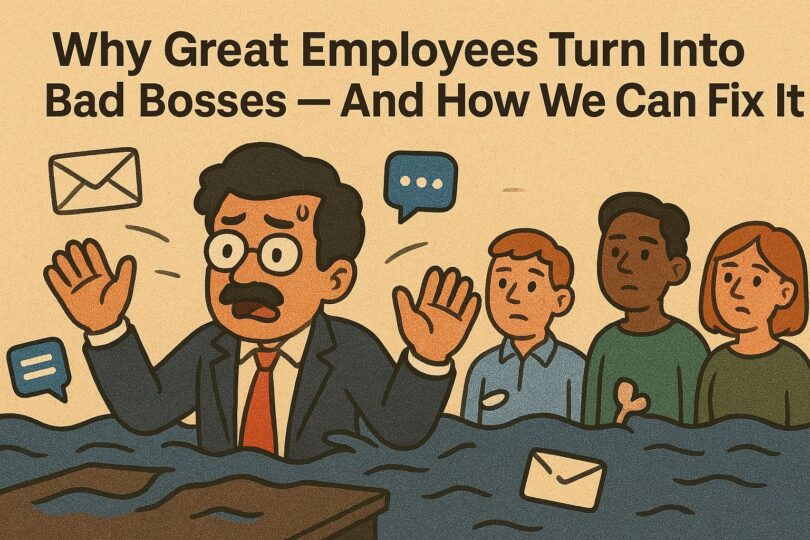After two decades in IT, digital marketing, and sales leadership across the GCC, I’ve asked myself the same question more times than I care to admit:
“Why are some managers so bad at managing?”
From backend code reviews for a high-traffic eCommerce platform in Dubai to high-stakes marketing war rooms in Riyadh, I’ve seen top-tier talent fall apart after being promoted. The common thread? These people were never trained to lead—just rewarded for excelling in their existing roles.
This isn’t a people problem. It’s a system problem. And the Peter Principle explains it perfectly.
What is the Peter Principle?
Coined by Dr. Laurence J. Peter in 1969, the Peter Principle states:
“Employees rise to the level of their incompetence.”
In simple terms, we promote people based on how well they do their current job, not whether they’re ready for the next one.
Real Story: When a Rockstar Developer Becomes a Bottleneck
A high-performing backend engineer, known for solving critical scalability challenges and deploying mission-critical features, was promoted to Engineering Manager. Within three months:
- Daily standups turned chaotic
- He micromanaged instead of delegating
- Team morale dropped
- Two senior developers resigned

This wasn’t a failure in technical skill—it was a failure to transition into leadership without support.
Why Skill Doesn’t Equal Leadership
In IT, marketing, and sales, high performance doesn’t automatically translate to leadership readiness.
Case #1: The Frontend Genius Who Lost His Team
A frontend engineer, celebrated for writing pixel-perfect code and solving complex UI issues, was promoted to Team Lead based on his technical mastery. However:
- His code reviews became overly critical
- He spent time fixing issues himself rather than guiding
- Standups became lectures, stifling team engagement
Within weeks, team morale dipped, and transfers were requested. Leadership requires a different skillset—not just technical acumen.
Case #2: Marketing Strategist Turned Manager
A digital strategist who excelled in campaign planning and audience targeting was elevated to Marketing Manager. But as soon as people management entered the mix:
- Her team felt unheard and underutilized
- Creative momentum stalled
- Reporting delays caused stakeholder concerns
She was great at marketing—but hadn’t been prepared to lead a team.
Case #3: Backend Dev to Tech Lead Without Support
A backend developer well-versed in microservices and API integrations was promoted to Tech Lead. The problems began almost immediately:
- He kept taking on core development work instead of enabling his team
- Avoided giving feedback for fear of conflict
- Team members began duplicating efforts due to lack of direction
Only after mentorship and structured coaching did he grow into the role.

Case #4: Sales Closer to Head of Sales
A sales rep who consistently closed high-value deals was made Head of Sales. But leadership requires scaling others, not just individual wins:
- He couldn’t coach or build a repeatable sales process
- Team productivity dropped
- Frustration turned into burnout
Eventually, a non-managerial sales enablement track proved to be a better fit.
The Data Doesn’t Lie
- Gallup found only 1 in 10 people have natural management talent.
- Google’s Project Oxygen showed that technical skills are the least important factor in great managers.
- Poor management has cost U.S. businesses $223 billion in turnover in just 5 years.
We often think of failure in middle management—but top leadership is just as vulnerable to the Peter Principle.
Take Steve Ballmer. An electric Microsoft salesman, but as CEO, he laughed off the iPhone and launched a string of failed products.
Or John Sculley, the Pepsi exec who ousted Steve Jobs and almost derailed Apple.
Or my personal favorite case study—Dick Fuld, CEO of Lehman Brothers. He was a trading genius, but his ego and denial during the 2008 financial crisis led to the biggest bankruptcy in U.S. history.
Even the military isn’t immune. In a 1763 German play, a Sergeant refuses promotion saying, “I am a good Sergeant. I might easily make a bad Captain.” Some truths are timeless.
Why It Matters in IT, Marketing & Sales
In project-based industries, poor leadership isn’t just a HR issue—it impacts delivery, retention, and revenue.
Software Dev Case: PM Role Goes Off Track
A senior mobile developer with exceptional coding abilities was promoted to Project Manager. Without leadership training:
- Sprint planning became chaotic
- Communication breakdowns affected delivery
- Client escalations became frequent
When reassigned to a solution architect role, he regained confidence and performance.
Creative Chaos: Writer to Director
A top copywriter known for crafting high-converting content was promoted to Creative Director. The result?
- Delays in campaign launches
- Tension among junior writers
- A drop in team innovation
Writing and managing are fundamentally different crafts.
Scaling Issues in Sales
A high-achieving closer was tasked with leading the entire sales team. He failed to:
- Develop training modules
- Scale his approach to fit different team strengths
- Establish a collaborative team culture
An alternative growth path as a sales strategist gave him renewed purpose and success.
The Fix: A Blueprint to Avoid the Peter Principle
Here’s what we’ve learned at Techies Infotech after years of trial, error, and client-side firefighting across Dubai, KSA, and beyond:
1. Separate leadership and performance tracks.
- Not everyone wants to manage people. That’s OK.
- Create senior IC (individual contributor) roles that are as respected as leadership ones.
2. Train before you promote.
- If someone wants to be a leader, start them with mentorship.
- Offer shadowing, communication workshops, and project ownership before giving a title.
3. Lateral moves > Upward moves (at first).
- Shift roles to broaden exposure.
- Let your Dev Lead work with Product for a quarter.
- Let Marketing Strategists co-pilot with Sales to learn client handling.
4. Rethink your promotion logic.
- Some companies like McKinsey and Bain use “up-or-out.” Others experiment with random promotions, and bizarrely, it can work.
- The key is agility—your org shouldn’t force linear growth.
The Career Trap: Chasing Titles vs Purpose
We spend 80,000+ hours working. Chasing the next title might seem like growth, but it could be a trap.
Management isn’t for everyone. And that’s okay.
As leaders, we must:
- Give people permission to choose mastery over hierarchy
- Normalize opting out of management
- Respect ICs equally
Final Thoughts
The Peter Principle isn’t about blaming people—it’s about fixing systems.
As leaders, we need to stop pushing top performers into roles that don’t align with their talents.
As professionals, we need to be honest about what we want. Management isn’t the only path to growth. Skill, strategy, creativity—they all matter.
I’d love to hear from you— Have you seen the Peter Principle in action? What would your ideal promotion system look like?
Let’s talk.

